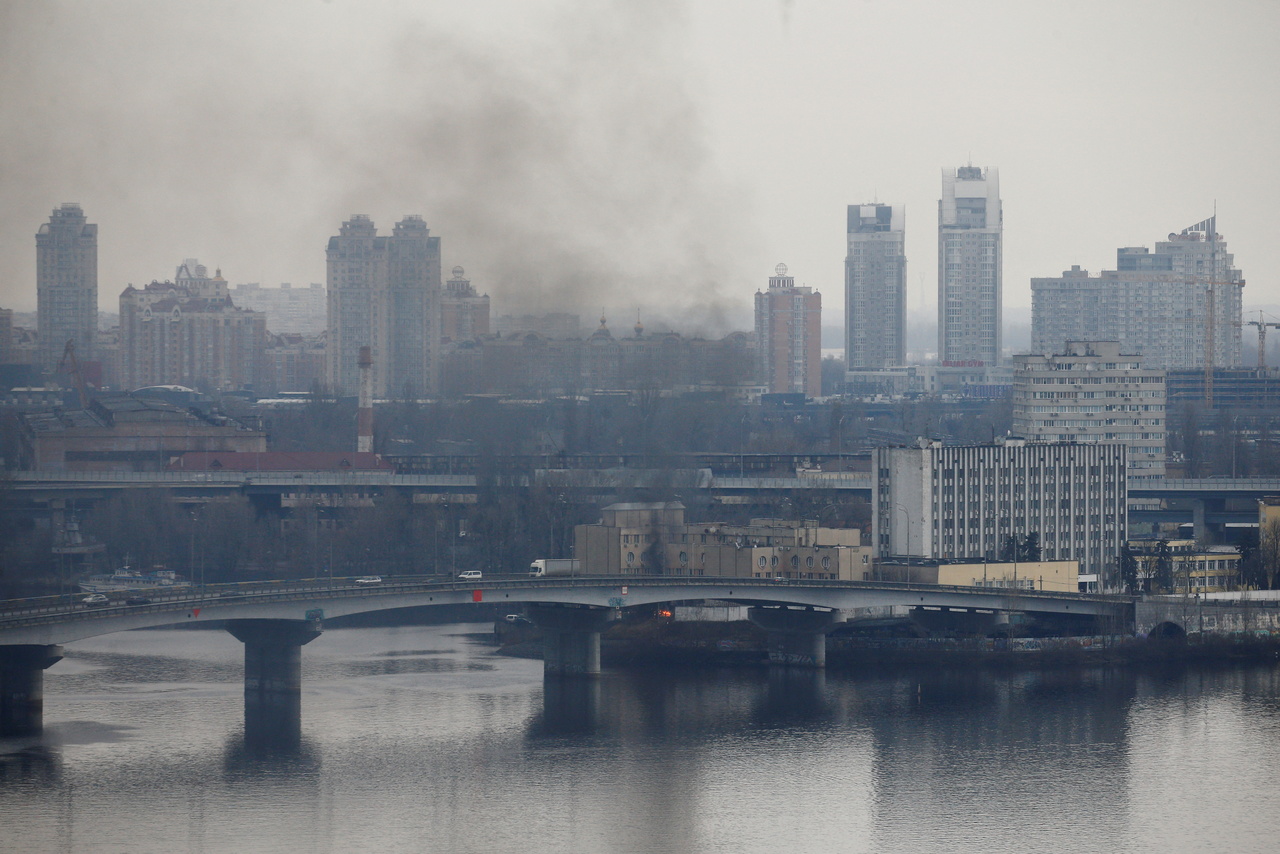Russian invasion of Ukraine has lessons for Indo-Pacific area: EU special envoy
Sign up now: Get ST's newsletters delivered to your inbox

Smoke rises from the territory of the Ukrainian Defence Ministry's unit, in Kyiv, on Feb 24, 2022.
PHOTO: REUTERS
SINGAPORE - The Russian invasion of Ukraine on Thursday (Feb 24) morning is a brazen violation of international law and holds lessons for the Indo-Pacific area, despite its distance from the conflict, said the European Union special envoy to the region Gabriele Visentin.
"The main lesson, not just for us, but universally, is that different views should be solved by diplomacy and negotiations and not by the use of force. That's as simple as that," he said, responding to questions from the press at a EU-S.Rajaratnam School of International Studies (RSIS) seminar at The Fullerton Hotel on Thursday.
"What's happening in Ukraine is blatant evidence of non-respect of international law. It's blatant evidence of non-respect of the United Nations charter. It's blatant non-respect of the national sovereignty of one state," he added.
"This is a lesson which is learnt in Eastern Europe, but it should be learnt as well for the rest of the world. Even if it's 10,000km away from here, it tells us and speaks to us very, very, very clearly."
His comments come as Russian forces shell major cities in Ukraine and as Ukrainian troops engage Russian soldiers in a war that has already been characterised as the worst military conflict in Europe since World War II.
Western nations are at the moment scrabbling together a response to the latest developments. Even as the conference was ongoing, European Commission president Ursula von der Leyen referred to sweeping sanctions that, if approved, will "weaken Russia's economic base and its capacity to modernise".
Mr Visentin reassured those present that sanctions against Moscow will be "severe and hard-hitting".
"The situation is evolving by the hour. They said when Russian action was still limited to the breakaway regions that there was a first package of sanctions on its way but there will be others. Literally, there are other ammunition at our disposal should Russia increase its military offensive," he added.
He declined to say more, and said more details of the EU response should be clear after an extraordinary summit in Brussels that has been called on Thursday.
The EU-RSIS conference was meant to be on the EU's strategy for cooperation in the Indo-Pacific, but the distressing news in Ukraine dominated concerns.
The EU recently published its strategy for cooperation in the Indo-Pacific, including a commitment to maintain a rules-based order in the region that stretches from the Middle East to the Pacific Islands.
Its member states have stepped up their military presence, and the EU has pledged to conduct more joint exercises and port calls with partners to protect freedom of navigation in the region, including recent missions in the Strait of Hormuz and the Gulf of Guinea.
Asked what other options the EU has to prevent countries from stepping out of line, Mr Visentin said: "We have mechanisms for coordinating sanctions with the UN sanctions and with single states which are not part of the EU. So we have mechanisms which allow us to coordinate for example with the United States, the United Kingdom, with Australia, and so on.
"The EU is not a military power and the EU does not have an army, a navy, an air force of its own. It's the member states of the EU that have these."
Geopolitical tensions in the Indo-Pacific have risen, with the heightened competition between the US and China a key concern, he said.
The Indo-Pacific is one of the most militarised regions in the world, with China, India, Russia, Japan, South Korea and Australia all among the top 10 military spenders.
Conversation at the conference also touched on a survey done by the ISEAS-Yusof Ishak Institute last year, in which thought leaders in Asean countries said they now have a lower opinion of the EU's commitment to free trade.
A representative from the EU Centre in Singapore suggested at the conference that this could be due to the bloc's concept of "strategic autonomy".
The concept underlines the EU's aspiration to be able to act independently, to "an appropriate level".
It was first used in the context of defence and security, but has since been expanded to include economic and technological autonomy, leading some to see it as the bloc turning inwards towards more protectionism.
Mr Visentin said this is a mischaracterisation. "There is a clear need for diversification of supply chains, but this does not mean protectionism.
"On the contrary, it means even more trade with more countries, differentiating the kind of dependency that we have. One striking example for the region is microchips. There is a clear need to differentiate the supply chain of microchips."
Asked if the EU would consider a free trade agreement with Asean, Mr Visentin said there are currently no plans for one, with the bloc preferring to forge deals with individual countries.
There are also no plans for the EU to join the Comprehensive and Progressive Agreement for Trans-Pacific Partnership, which seeks to secure a level playing field and rules-based trade environment in the region.


